摆脱英语作文的“垃圾词汇.docx
- 格式:docx
- 大小:60.67 KB
- 文档页数:13
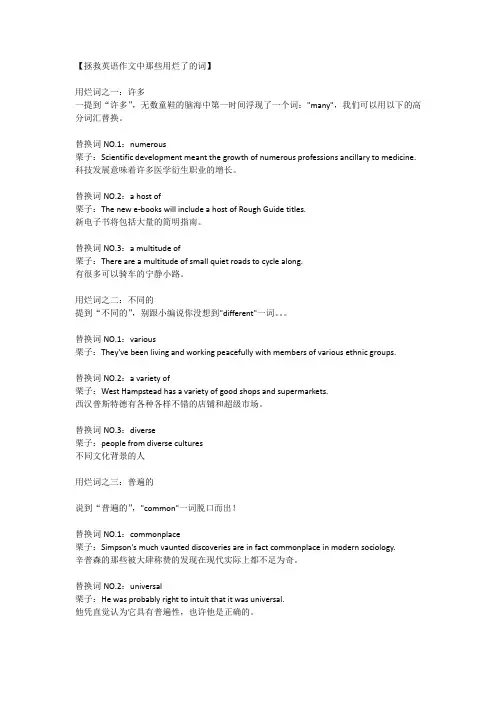
【拯救英语作文中那些用烂了的词】用烂词之一:许多一提到“许多”,无数童鞋的脑海中第一时间浮现了一个词:"many",我们可以用以下的高分词汇替换。
替换词NO.1:numerous栗子:Scientific development meant the growth of numerous professions ancillary to medicine. 科技发展意味着许多医学衍生职业的增长。
替换词NO.2:a host of栗子:The new e-books will include a host of Rough Guide titles.新电子书将包括大量的简明指南。
替换词NO.3:a multitude of栗子:There are a multitude of small quiet roads to cycle along.有很多可以骑车的宁静小路。
用烂词之二:不同的提到“不同的”,别跟小编说你没想到"different"一词。
替换词NO.1:various栗子:They've been living and working peacefully with members of various ethnic groups.替换词NO.2:a variety of栗子:West Hampstead has a variety of good shops and supermarkets.西汉普斯特德有各种各样不错的店铺和超级市场。
替换词NO.3:diverse栗子:people from diverse cultures不同文化背景的人用烂词之三:普遍的说到“普遍的”,"common"一词脱口而出!替换词NO.1:commonplace栗子:Simpson's much vaunted discoveries are in fact commonplace in modern sociology.辛普森的那些被大肆称赞的发现在现代实际上都不足为奇。
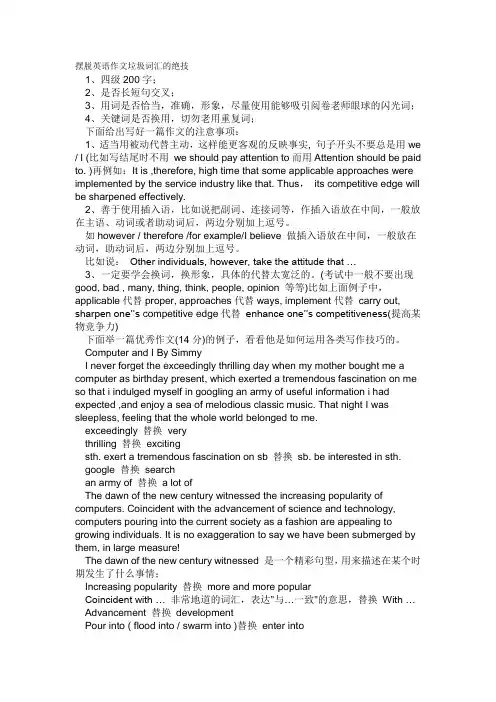
摆脱英语作文垃圾词汇的绝技1、四级200字;2、是否长短句交叉;3、用词是否恰当,准确,形象,尽量使用能够吸引阅卷老师眼球的闪光词;4、关键词是否换用,切勿老用重复词;下面给出写好一篇作文的注意事项:1、适当用被动代替主动,这样能更客观的反映事实, 句子开头不要总是用we / I (比如写结尾时不用we should pay attention to而用Attention should be paid to. )再例如:It is ,therefore, high time that some applicable approaches were implemented by the service industry like that. Thus,its competitive edge will be sharpened effectively.2、善于使用插入语,比如说把副词、连接词等,作插入语放在中间,一般放在主语、动词或者助动词后,两边分别加上逗号。
如however / therefore /for example/I believe 做插入语放在中间,一般放在动词,助动词后,两边分别加上逗号。
比如说:Other individuals, however, take the attitude that …3、一定要学会换词,换形象,具体的代替太宽泛的。
(考试中一般不要出现good, bad , many, thing, think, people, opinion 等等)比如上面例子中,applicable代替proper, approaches代替ways, implement代替carry out, sharpen one’’s competitive edge代替enhance one’’s competitiveness(提高某物竞争力)下面举一篇优秀作文(14分)的例子,看看他是如何运用各类写作技巧的。
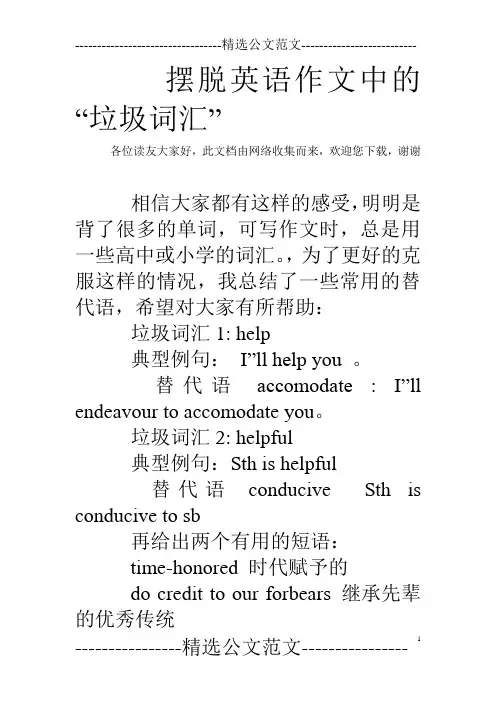
摆脱英语作文中的“垃圾词汇”各位读友大家好,此文档由网络收集而来,欢迎您下载,谢谢相信大家都有这样的感受,明明是背了很多的单词,可写作文时,总是用一些高中或小学的词汇。
,为了更好的克服这样的情况,我总结了一些常用的替代语,希望对大家有所帮助:垃圾词汇1: help典型例句:I”ll help you 。
替代语accomodate : I”ll endeavour to accomodate you。
垃圾词汇2: helpful典型例句:Sth is helpful替代语conducive Sth is conducive to sb再给出两个有用的短语:time-honored 时代赋予的do credit to our forbears 继承先辈的优秀传统垃圾词汇3: show典型例句:as it shows in the picture替代语betray垃圾词汇4: think典型例句:i think ---- ----替代语deem垃圾词汇5: ugly典型例句:xxx is ugly替代语hideous垃圾词汇6: by the way典型例句:by the way,...。
替代语incidentally,...。
垃圾词汇7: because典型例句:xxx because xxx替代语in that/in as much as : xxx because xxx垃圾词汇8: consider典型例句:We must consider xxx替代语:allow for : We must allow for xxx垃圾词汇9: much典型例句:there has been a muchincrease in the world population替代语:there has been a drastic increase in the -----垃圾词汇10: about典型例句:it is about 250 times of that替代语it is approximately ---垃圾词汇11: buy替代语purchase只要我们每天积累1-2个短语,1-2个月后,我们的作文水平一定会有质的飞跃。
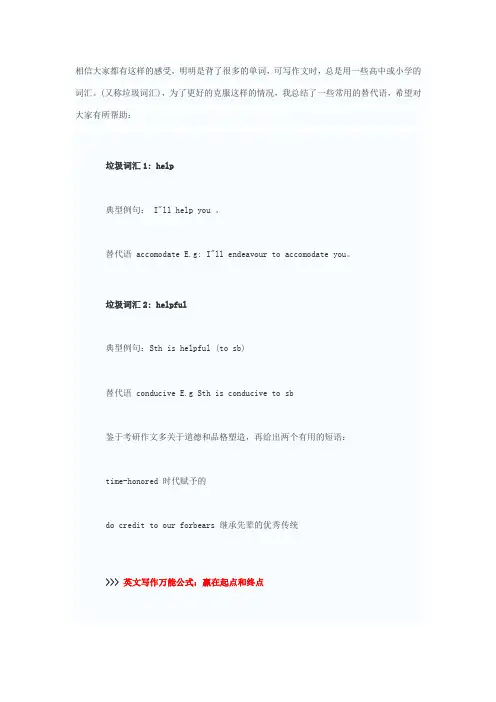
相信大家都有这样的感受,明明是背了很多的单词,可写作文时,总是用一些高中或小学的词汇。
(又称垃圾词汇),为了更好的克服这样的情况,我总结了一些常用的替代语,希望对大家有所帮助:垃圾词汇1: help典型例句: I"ll help you 。
替代语 accomodate E.g: I"ll endeavour to accomodate you。
垃圾词汇2: helpful典型例句:Sth is helpful (to sb)替代语 conducive E.g Sth is conducive to sb鉴于考研作文多关于道德和品格塑造,再给出两个有用的短语:time-honored 时代赋予的do credit to our forbears 继承先辈的优秀传统>>> 英文写作万能公式:赢在起点和终点垃圾词汇3: show典型例句:as it shows in the picture 替代语 betray垃圾词汇4: think典型例句: i think ---- ----替代语deem垃圾词汇5: ugly典型例句: xxx is ugly替代语 hideous垃圾词汇6: by the way典型例句: by the way,...。
替代语 incidentally,...。
>>> 英语写作:留心四条戒律突破汉译英垃圾词汇7: because典型例句: xxx because xxx替代语 in that/in as much as E.g: xxx because xxx垃圾词汇8: consider典型例句: We must consider xxx替代语: allow for E.g : We must allow for xxx垃圾词汇9: much典型例句: there has been a much increase in the world population 替代语:there has been a drastic increase in the -----垃圾词汇10: about典型例句:it is about 250 times of that替代语 it is approximately ---垃圾词汇11: buy替代语purchase只要我们每天积累1-2个短语,1-2个月后,我们的作文水平一定会有质的飞跃。
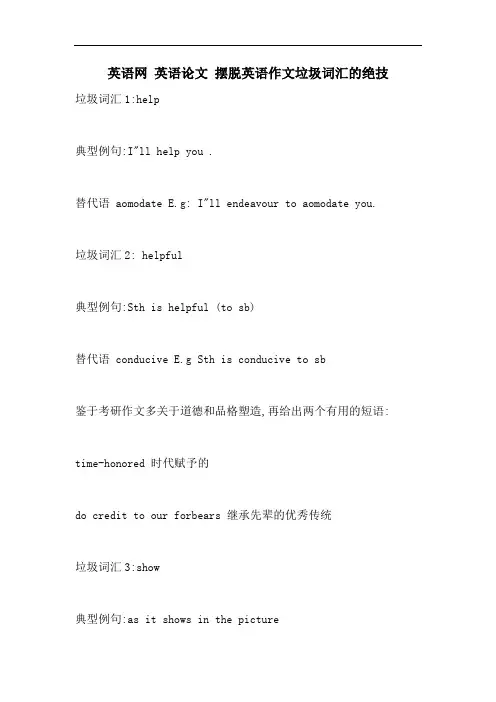
英语网英语论文摆脱英语作文垃圾词汇的绝技垃圾词汇1:help典型例句:I"ll help you .替代语 aomodate E.g: I"ll endeavour to aomodate you.垃圾词汇2: helpful典型例句:Sth is helpful (to sb)替代语 conducive E.g Sth is conducive to sb鉴于考研作文多关于道德和品格塑造,再给出两个有用的短语:time-honored 时代赋予的do credit to our forbears 继承先辈的优秀传统垃圾词汇3:show典型例句:as it shows in the picture替代语 betray垃圾词汇4:think典型例句:i think ---- ---- 替代语deem垃圾词汇5:ugly典型例句:xxx is ugly替代语 hideous垃圾词汇6:by the way典型例句:by the way,.... 替代语 incidentally,.... 垃圾词汇7: because典型例句:xxx because xxx替代语 in that/in as much as E.g: xxx because xxx垃圾词汇8: consider典型例句: We must consider xxx替代语: allow for E.g : We must allow for xxx垃圾词汇9: much典型例句: there has been a much increase in the world population替代语:there has been a drastic increase in the -----垃圾词汇10: about典型例句:it is about 250 times of that替代语 it is approximately ---垃圾词汇11: buy替代语purchase只要我们每天积累1-2个短语,1-2个月后,我们的作文水平一定会有质的飞跃.欢迎大家给出更好的替代语和模板,内容仅供参考。
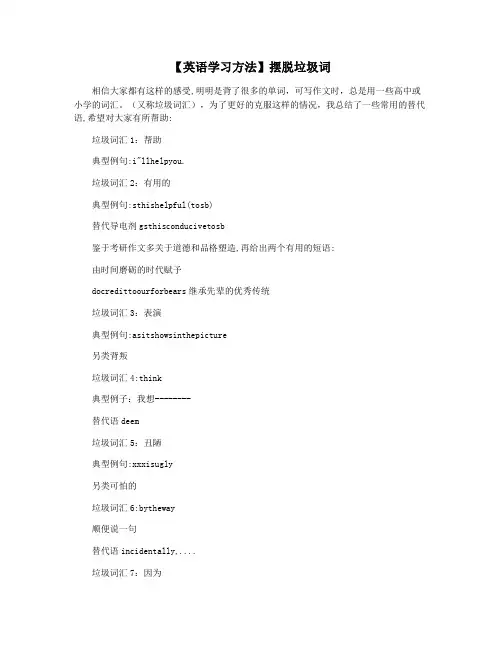
【英语学习方法】摆脱垃圾词
相信大家都有这样的感受,明明是背了很多的单词,可写作文时,总是用一些高中或小学的词汇。
(又称垃圾词汇),为了更好的克服这样的情况,我总结了一些常用的替代语,希望对大家有所帮助:
垃圾词汇1:帮助
典型例句:i"llhelpyou.
垃圾词汇2:有用的
典型例句:sthishelpful(tosb)
替代导电剂gsthisconducivetosb
鉴于考研作文多关于道德和品格塑造,再给出两个有用的短语:
由时间磨砺的时代赋予
docredittoourforbears继承先辈的优秀传统
垃圾词汇3:表演
典型例句:asitshowsinthepicture
另类背叛
垃圾词汇4:think
典型例子:我想--------
替代语deem
垃圾词汇5:丑陋
典型例句:xxxisugly
另类可怕的
垃圾词汇6:bytheway
顺便说一句
替代语incidentally,....
垃圾词汇7:因为
典型例句:xxxbecausexxx
备选方案:进入/进入第g阶段:xxxbecausexxx 垃圾词汇8:consider
典型示例:我们必须考虑XXX
替代语:allowfore.g:wemustallowforxxx。
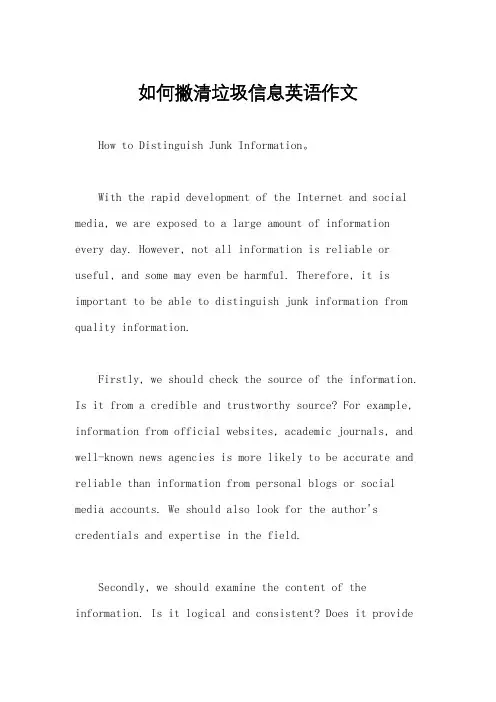
如何撇清垃圾信息英语作文How to Distinguish Junk Information。
With the rapid development of the Internet and social media, we are exposed to a large amount of information every day. However, not all information is reliable or useful, and some may even be harmful. Therefore, it is important to be able to distinguish junk information from quality information.Firstly, we should check the source of the information. Is it from a credible and trustworthy source? For example, information from official websites, academic journals, and well-known news agencies is more likely to be accurate and reliable than information from personal blogs or social media accounts. We should also look for the author's credentials and expertise in the field.Secondly, we should examine the content of the information. Is it logical and consistent? Does it provideevidence to support its claims? Does it use emotional language or sensational headlines to attract attention? If the information seems too good to be true or lacks evidence, it may be junk information.Thirdly, we should consider the context of the information. Is it relevant to our interests or needs? Isit up-to-date and timely? Does it provide a balanced and objective perspective? If the information is outdated or biased, it may not be useful or reliable.Lastly, we should use critical thinking skills to evaluate the information. We should ask ourselves questions such as: What is the purpose of this information? Who isthe target audience? What are the potential consequences of believing or sharing this information? By using critical thinking skills, we can avoid being misled by junk information and make informed decisions.In conclusion, distinguishing junk information from quality information requires us to be vigilant, critical, and discerning. By following these guidelines, we can avoidbeing overwhelmed by the vast amount of information available and make the most of the information that is reliable and useful.。
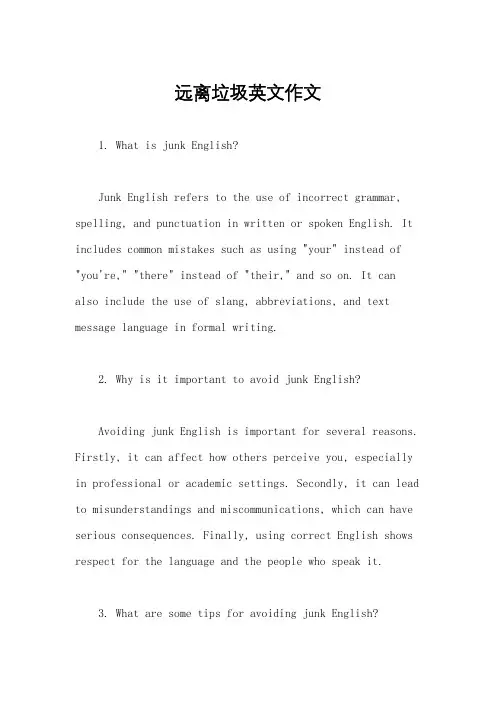
远离垃圾英文作文1. What is junk English?Junk English refers to the use of incorrect grammar, spelling, and punctuation in written or spoken English. It includes common mistakes such as using "your" instead of "you're," "there" instead of "their," and so on. It can also include the use of slang, abbreviations, and text message language in formal writing.2. Why is it important to avoid junk English?Avoiding junk English is important for several reasons. Firstly, it can affect how others perceive you, especially in professional or academic settings. Secondly, it can lead to misunderstandings and miscommunications, which can have serious consequences. Finally, using correct English shows respect for the language and the people who speak it.3. What are some tips for avoiding junk English?One tip for avoiding junk English is to proofread your writing carefully before submitting it. This includes checking for spelling and grammar errors, as well as ensuring that your sentences are clear and concise. Another tip is to read widely and regularly, as this can help you develop a better understanding of the language and how it should be used.4. How can we encourage others to avoid junk English?One way to encourage others to avoid junk English is to lead by example. By using correct English in our ownwriting and speech, we can show others the importance of doing the same. We can also offer constructive feedback when we notice mistakes, and provide resources such as grammar guides or language learning apps to help others improve their skills.。
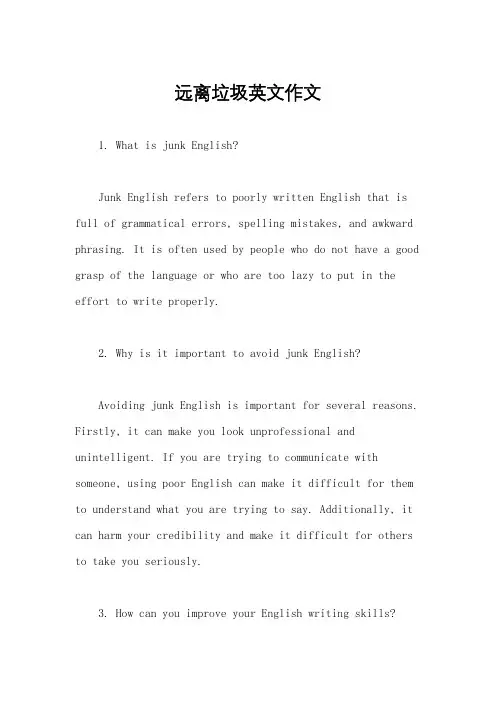
远离垃圾英文作文1. What is junk English?Junk English refers to poorly written English that is full of grammatical errors, spelling mistakes, and awkward phrasing. It is often used by people who do not have a good grasp of the language or who are too lazy to put in the effort to write properly.2. Why is it important to avoid junk English?Avoiding junk English is important for several reasons. Firstly, it can make you look unprofessional and unintelligent. If you are trying to communicate with someone, using poor English can make it difficult for them to understand what you are trying to say. Additionally, it can harm your credibility and make it difficult for others to take you seriously.3. How can you improve your English writing skills?Improving your English writing skills takes time and effort, but there are several things you can do to make progress. Firstly, you should read as much as possible to expose yourself to different styles of writing and to learn new vocabulary. Secondly, practice writing regularly, whether it is through journaling, blogging, or writing essays. Finally, seek feedback from others, whether it is from a teacher, friend, or writing group, to help you identify areas for improvement.4. What are some common mistakes to avoid when writing in English?Some common mistakes to avoid when writing in English include using incorrect verb tenses, confusing homophones (words that sound the same but have different meanings), and using overly complex or convoluted sentences. It is also important to proofread your writing carefully to catch any spelling or grammatical errors before submitting it.5. Can technology help improve your English writingskills?Yes, technology can be a helpful tool for improving your English writing skills. There are many online resources available, such as grammar checkers and writing prompts, that can help you identify and correct errors in your writing. Additionally, using language learning apps or taking online courses can provide structured guidance and feedback on your writing.。
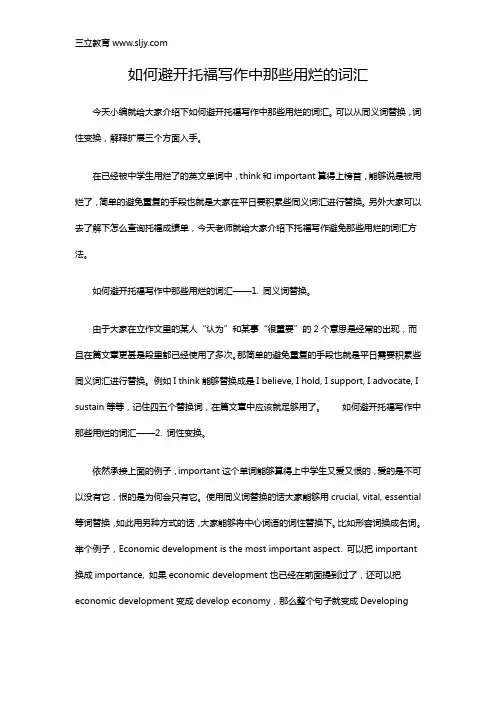
如何避开托福写作中那些用烂的词汇今天小编就给大家介绍下如何避开托福写作中那些用烂的词汇。
可以从同义词替换,词性变换,解释扩展三个方面入手。
在已经被中学生用烂了的英文单词中,think和important算得上榜首,能够说是被用烂了,简单的避免重复的手段也就是大家在平日要积累些同义词汇进行替换。
另外大家可以去了解下怎么查询托福成绩单,今天老师就给大家介绍下托福写作避免那些用烂的词汇方法。
如何避开托福写作中那些用烂的词汇——1. 同义词替换。
由于大家在立作文里的某人“认为”和某事“很重要”的2个意思是经常的出现,而且在篇文章更甚是段里都已经使用了多次。
那简单的避免重复的手段也就是平日需要积累些同义词汇进行替换。
例如I think能够替换成是I believe, I hold, I support, I advocate, I sustain等等,记住四五个替换词,在篇文章中应该就足够用了。
如何避开托福写作中那些用烂的词汇——2. 词性变换。
依然承接上面的例子,important这个单词能够算得上中学生又爱又恨的,爱的是不可以没有它,恨的是为何会只有它。
使用同义词替换的话大家能够用crucial, vital, essential 等词替换,如此用另种方式的话,大家能够将中心词语的词性替换下。
比如形容词换成名词。
举个例子,Economic development is the most important aspect. 可以把important 换成importance, 如果economic development也已经在前面提到过了,还可以把economic development变成develop economy,那么整个句子就变成Developingeconomy is attached the most importance. 想不出同义词的时候,我们可以试试能不能把中心词的词性变换下。
如何避开托福写作中那些用烂的词汇——3. 解释扩展。
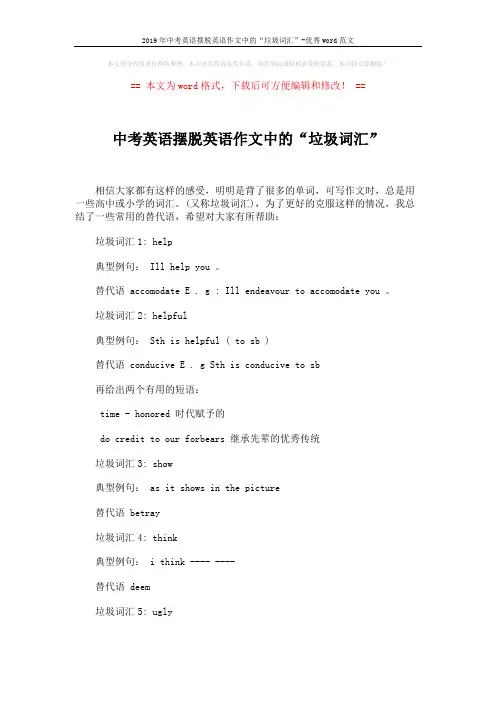
2019年中考英语摆脱英语作文中的“垃圾词汇”-优秀word范文
本文部分内容来自网络整理,本司不为其真实性负责,如有异议或侵权请及时联系,本司将立即删除!
== 本文为word格式,下载后可方便编辑和修改! == 中考英语摆脱英语作文中的“垃圾词汇”
相信大家都有这样的感受,明明是背了很多的单词,可写作文时,总是用一些高中或小学的词汇。
(又称垃圾词汇),为了更好的克服这样的情况,我总结了一些常用的替代语,希望对大家有所帮助:
垃圾词汇1: help
典型例句: Ill help you 。
替代语 accomodate E . g : Ill endeavour to accomodate you 。
垃圾词汇2: helpful
典型例句: Sth is helpful ( to sb )
替代语 conducive E . g Sth is conducive to sb
再给出两个有用的短语:
time - honored 时代赋予的
do credit to our forbears 继承先辈的优秀传统
垃圾词汇3: show
典型例句: as it shows in the picture
替代语 betray
垃圾词汇4: think
典型例句: i think ---- ----
替代语 deem
垃圾词汇5: ugly。
如何撇清垃圾信息英语作文Title: Clarifying Misinformation: A Guide to Navigating Junk Information。
In today's digital age, where information spreads rapidly across various platforms, distinguishing between credible sources and misinformation has become increasingly challenging. The proliferation of junk information poses a significant threat to informed decision-making and societal well-being. Thus, it's imperative to develop strategies to sift through the noise and discern truth from falsehood. In this essay, we will explore effective methods to identify and refute misinformation.Firstly, it's essential to scrutinize the source of the information. Reputable sources, such as peer-reviewed journals, established news outlets, and academic institutions, are more likely to provide accurate and reliable information. Conversely, sources with a history of bias or sensationalism should be approached with caution.Fact-checking websites can also be valuable tools in verifying the credibility of a claim.Furthermore, evaluating the author's expertise and credentials can offer insights into the reliability of the information. Authors with relevant qualifications and experience in the subject matter are more likely to produce credible content. Additionally, examining the publication's date is crucial, as outdated information may no longer be relevant or accurate in the current context.Another effective strategy is to cross-reference information from multiple sources. Comparing multiple sources allows for a more comprehensive understanding of the topic and helps identify inconsistencies or contradictions. Moreover, consulting diverse perspectives can mitigate the risk of confirmation bias and provide a more balanced view of the issue at hand.Critical thinking skills play a pivotal role in discerning misinformation. Rather than accepting information at face value, it's essential to question themotives behind the dissemination of the information and critically evaluate the evidence provided. Logicalfallacies, such as ad hominem attacks or appeals to emotion, are often employed to manipulate opinions and distort facts. By recognizing these fallacies, individuals can better assess the validity of the information presented.Additionally, cultivating media literacy is crucial in navigating the digital landscape effectively. Medialiteracy involves the ability to analyze, evaluate, and create media content critically. By understanding how information is produced, disseminated, and consumed, individuals can become more discerning consumers of information and less susceptible to manipulation by malicious actors.In the age of social media, where misinformation can spread rapidly through viral posts and clickbait headlines, it's essential to practice responsible sharing. Before sharing information online, individuals should verify the accuracy of the content and consider the potential consequences of spreading misinformation. By exercisingcaution and diligence, individuals can help prevent the further propagation of false information.Moreover, fostering open dialogue and constructive discourse can help counteract the spread of misinformation. By engaging in respectful discussions and sharing reliable sources, individuals can contribute to a more informed and educated society. Additionally, teaching critical thinking skills and media literacy in educational settings can empower individuals to navigate the complexities of the digital world effectively.In conclusion, combating misinformation requires a multifaceted approach that encompasses critical thinking, media literacy, and responsible sharing practices. By employing strategies such as verifying sources, cross-referencing information, and cultivating critical thinking skills, individuals can navigate the digital landscape with confidence and integrity. Ultimately, by working together to promote truth and accuracy, we can mitigate the harmful effects of misinformation and foster a more informed and enlightened society.。
用烂词之八:重要的不造大家六级作文第一句会不会这样写:With the development of ...,XX bec omes more and more important.不知大家是否中枪,反正小编曾经干过这事,毕竟是经典句型啊。
但是,也不得不承认一个事实,那就是略俗,尤其"important"有点扎眼,索性我们把它换了呗!替换词NO.1 vital栗子:Support from those closest to you is vital in these trying times.在这些困难的时刻,最亲近的人给予你的支持至关重要。
替换词NO.2 crucial栗子:Talent, hard work and sheer tenacity are all crucial to career success.事业要成功,才能、勤奋和顽强的意志都至关重要。
替换词NO.3 prominent栗子:Political trials were being used to keep prominent activists out of circulation.通过对著名活动家进行政治审判使其从公众视线中消失。
替换词NO.4 cardinal栗子:Respect for life is a cardinal principle of English law。
尊重生命是英国法律最重要的原则。
用烂词之九:优秀的说到"优秀的",一般我都习惯的脱口而出“good",顺便附上翘起的大拇指,然而,这个即使不会说英语的人都能够熟练使用,如果我们这学苦学英语N年的人再张口闭口"good”,是不是有点对不起我们花的学费捏。
因此,请用下面的词来替代。
替换词NO.1 excellent栗子:Large overseas-based trusts are an excellent each way bet.大型海外基金的投资前景非常好。
相信大家都有这样的感受,明明是背了很多的单词,可写作文时, 总是用一些高中或小学的词汇。
(又称垃圾词汇),为了更好的克服这样的情况,我总结了一些常用的替代语,希望对大家有所帮助:垃圾词汇1: help典型例句:I n ll help you。
替代语accomodate E.g: I n ll endeavour to accomodate you。
垃圾词汇2: helpful典型例句:Sth is helpful (to sb)替代语conducive E.g Sth is conducive to sb鉴于考研作文多关于道德和品格塑造,再给出两个有用的短语:time-honored时代赋予的do credit to our forbears继承先辈的优秀传统垃圾词汇3: show典型例句:as it shows in the picture替代语betray垃圾词汇4: think典型例句:i think ------------替代语deem垃圾词汇5: ugly典型例句:xxx is ugly替代语hideous垃圾词汇6: by the way 典型例句:by the way,…。
替代语incidentally,... o垃圾词汇7: because典型例句:xxx because xxx替代语in that/in as much as E.g: xxx because xxx垃圾词汇8: consider典型例句:We must consider xxx替代语:allow for E.g : We must allow for xxx垃圾词汇9: much典型例句:there has been a much increase in the world population 替彳弋语:there has been a drastic increase in the --------垃圾词汇10: about典型例句:it is about 250 times of that 替代语it is approximately 一・垃圾词汇11: buy替代语purchase只要我们每天积累1-2个短语,1-2个月后,我们的作文水平一定会有质的飞跃。
欢迎大家给出更好的替代语和更多的垃圾词汇。
让我们共同进步!1.You make me sick!你真让我恶心!2.What' s wrong with you?你怎么回事?3.r m very disappointed.真让我失望。
5.You" re a jerk!你是个废物/混球!6.Don' t talk to me like that!别那样和我说话!7.Who do you think you are?你以为你是谁?8.What' s your problem?你怎么回事啊?9.1hate you!我讨厌你!10.1don" t want to see your face!我不愿再见到你!11.You,re crazy!你疯了!12.Are you insane/crazy/out of your mind?你疯了吗?13 ・ Don' t bother me.别烦我。
14.Knock it off.少来这一套。
15.Get out of my face.从我面前消失!16.Leave me alone・走开。
17.Get lost.滚开!18.Take a hike!哪儿凉快哪儿歇着去吧。
19.You piss me off.你气死我了。
20.It" s none of your business.关你屁事!21.What" s the meaning of this?这是什么意思?22.How dare you!你敢!23.Cut it out.省省吧。
24.You stupid jerk!你这蠢*!25.You have a lot of nerve.脸皮真厚。
26.r m fed up.我厌倦了。
27・I cad t take it anymore.我受不了了!(李阳老师常用)28.F ve had enough of your garbage.我听腻了你的废话。
29.Shut up!闭嘴!30.What do you want?你想怎么样?31.Do you know what time it is?你知道现在都几点吗?32.What were you thinking?你脑子进水啊?33.How can you say that?你怎么可以这样说?34.Who says?谁说的?35.That" s what you think!那才是你脑子里想的!36.Don,t look at me like that.别那样看着我。
37.What did you say?你说什么?38.You are out of your mind.你脑子有毛病!39.You make me so mad•你气死我了啦。
40.Drop dead.去死吧!41.Don,t give me your shit.别跟我胡扯。
42.Don' t give me your excuses/ No more excuses・另ll找借口。
43.Nonsense!鬼话!44.You' re a pain in the ass•你这讨厌鬼。
45.You? re an asshole.你这缺德鬼。
46.You asked for it.你自找的。
47.Get over yourself.别自以为是。
48.You" re nothing to me.你对我什么都不是。
49.It" s not my fault.不是我的错。
50.You look guilty.你看上去心虚。
51.1can? t help it.我没办法。
52. That" s your problem.那是你的问题。
53.1don? t want to hear it.我不想听!54.Get off my back.少跟我罗嗦。
55.Give me a break.饶了我吧。
56.Who do you think you" re talking to?你以为你在跟谁说话?57.Look at this mess!看看这烂摊子!58.You" re so careless.你真粗心。
59.Why on earth didn? t you tell me the truth?你到底为什么不跟我说实话?60.m about to explode!我肺都快要气炸了 !61.What a stupid idiot!真是白痴一个!62.r m not going to put up with this!我再也受不了啦!63.1never want to see your face again!我再也不要见到你!64.That" s terrible.真糟糕!65.Just look at what you? ve done!看看你都做了些什么!66.1wish I had never met you.我真后悔这辈子遇到你!67.You" re a disgrace.你真丢人!68.r 11 never forgive you!我永远都不会饶恕你!69.Don,t nag me!别在我面前唠叨!70.V m sick of it.我都腻了。
71.Don? t you dare come back again!你敢再回来!72.Stop screwing/ fooling/ messing around!另ll鬼混了!73.Mind your own business!管好你自己的事!74.You" re just a good for nothing bum!你真是一个废物! / 你一无是处!75.You' ve gone too far!你太过分了!76.1loathe you!我讨厌你!77.1detest you!我恨你!78.Get the hell out of here!滚开!79.Don" t be that way!别那样!80.Can' t you do anything right?成事不足,败事有余。
81.You' re impossible.你真不可救药。
82.Don' t touch me!别碰我!83.Get away from me!离我远一点儿!84.Get out of my life.我不愿再见到你。
/从我的生活中消失吧。
85.You" re a joke!你真是一个小丑!86.Don" t give me your attitude.别跟我摆架子。
87.You? 11 be sorry.你会后悔的。
88.We^ re through.我们完了!89.Look at the mess you? ve made!你搞得一团糟!90.You" ve ruined everything.全都让你搞砸了。
91・Ican' t believe your never.你好大的胆子!92. You' re away too far.你太过分了。
93.1can, t take you any more!我再也受不了你啦!94. r m telling you for the last time!我最后再告诉你一次!95.1could kill you!我宰了你!96. That" s the stupidest thing I’ ve ever heard!那是我听到的最愚蠢的事!(比尔•盖茨常用)97.1can, t believe a word you say.我才不信你呢!98. You never tell the truth!你从来就不说实话!99・ Don,t push me !别逼我!100. Enough is enough!够了够了through—>in term o〃via operate—>manipulateoffspring—>descendant inevitable—dispensable detail—>specific explain—>interpret obvious一>conspicuous hurt—>vulnerable use 一>employ/utilizevalue—>merit provide—>lend — >offertrue—>accurateleading to —Contribute to/ conduce to/result in more and more—>increasing/growinghardly—>merely — >barely well-known — Outstanding large—>miraculous/marvelous although— >albeit/notwithstanding in fact—>actually/virtually want—>intend to/tend to/be inclined to because—>in that may be—>probablyto sum—>to summarize/in conclusionexplain — >interpret/illustratechange —>alertchance—>alternativecustom — >convention/traditionthink—>contemplate/muse/meditate/retrospect arouse—>ignite/stimulate/spur/motivatelimit 一>stress/hinder/hamper key— >crucial/vital/consequentialold—>ancientemphasis 一>accentuatedevote to—>dedicate tocharacter—>trait/individuality/idiosyncrasy/personality expect—>anticipatejoin—>participatedelegate—>representativebias—>prej udice/discriminate/tendencythrive—>palmy/floushing/prosperityclash—>conflict/collision/rencounter publicize — >propagandizeagree partly—>agree with reserve proper—>apposite want to —>desirebig city — >metropolislawmaking — >legislationfirst—>primarilybut—>nonetheless/neverthelesschild —>juvenile absorb—>assimilatehand in — >renderundermine 一>sap/enervate/deb i 1 itateget into chaos —>with chaos ensuingkey 一>pivot/cruxsway —>vacillatefanatic patriotism—>j ingoism/chauvinism persusive—>thorough/sound/specific/convincing consider—>take into accountvague—>gratuitous/unwarranted/oversimplified absorb—>assimilate agree partly —>agree with reserve although — >albeit/notwithstandingarouse—>ignite/stimulate/spur/motivate because—>in that bias —>prejudice/discriminate/tendencybig city —>metropolisbut—>nonetheless/nevertheless chance—>alternative change—>alertcharacter—>trait/individuality/idiosyncrasy/personality child—>juvenileclash—>conflict/collision/rencounterconsider—>take into accountcustom — >convention/tradition delegate—>representative detail—>specificdevote to—>dedicate to emphasis—>accentuate expect—>anticipate explain — >interpret explain— >interpret/illustrate fanaticpatriotism—>jingoism/chauvinismfirst—>primarily get into chaos —>with chaos ensuing hand in—>render hardly — >merely — >barelyhurt—>vulnerable in fact—>actually/virtually inevitable—dispensablejoin—>participatekey — >crucial/vital/consequentialkey 一>pivot/cruxlarge—>miraculous/marvelouslawmaking — >legislationleading to — >contribute to/ conduce to/result in limit—>stress/hinder/hamper may be—>probably more and more—>increasing/growingobvious — >conspicuousoffspring 一>descendantold—>ancientoperate — >manipulatepersusive—>thorough/sound/specific/convincing proper—>appositeprovide—>lend—>offerpublicize — >propagandizesway—>vacillatethink—>contemplate/muse/meditate/retrospect thrive—>palmy/floushing/prosperitythrough—>in term of/viato sum —>to summarize/in conclusion true—>accurate undermine—>sap/enervate/debilitateuse — >employ/utilizevague 一>gratuitous/unwarranted/oversimplifiedvalue —>merit want to —>desire want—>intend to/tend to/be inclined to well-known — >outstanding。